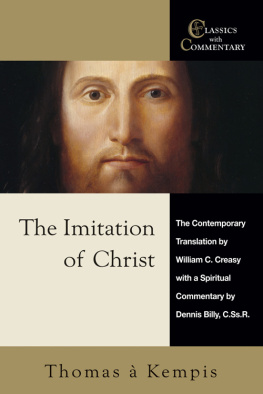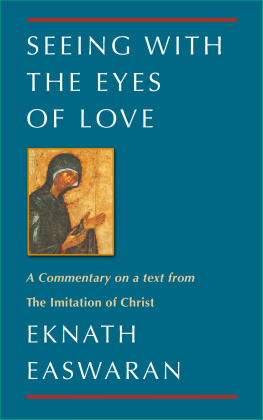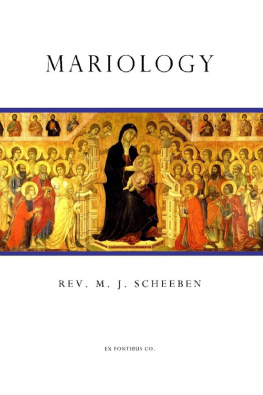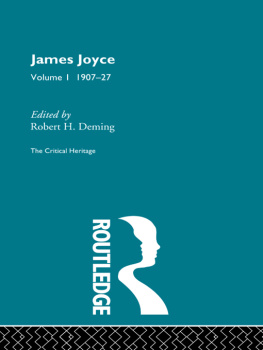A Meditation
on the Incarnation of Christ
Sermons
On the Life and Passion of Our Lord
and
Of Hearing and Speaking Good Words
by
Thomas Kempis
Canon regular of the Congregation of Windesheim

Authorised translation from the text of the edition of Michael Joseph Pohl, Ph. D.
by
Dom Vincent Scully, C. R. L.
Author of Life of the Venerable Thomas Kempis
(Permissu Superiorum)
London
KEGAN PAUL, TRENCH, TRBNER & CO., Ltd.
Dryden House, Gerrard Street, W.
1907
to
my esteemed friend
Sir Francis Cruise
This edition 2018 CrossReach Publications , Waterford, Ireland

Hope. Inspiration. Trust.
Were social! Follow us for new titles and deals:
FaceBook.com/CrossReachPublications
Twitter Handle: @CrossReachPub
Available in paperback and eBook editions
Please go online for more great titles
available through CrossReach Publications.
And if you enjoyed this book please consider leaving a
review . That helps us out a lot. Thanks.
The text of this book is in the public domain. All other rights
are reserved, including the right to reproduce this edition
or portions of it in any Form whatsoever without prior
written consent from the publisher.
Quick Table of contents
Introduction
A NEW critical text of the Omnia Opera of Thomas Kempis is being edited by Dr. M. Joseph Pohl, of Bonn, in seven volumes, of which four have already appeared, and the remainder are to be issued in the course of 1907. An eighth volume is to contain a life of the author, a dissertation on his various writings, and a vindication of his title to the Imitation by the same industrious hand. The publishers, Messrs. Herder, are doing their work in a way worthy of the subject matter, and of the painstaking toil of the editor; their volumes are a pleasure to behold and handle, a masterpiece of the printers and the bookbinders art, a contrast indeed to the unwieldy tomes and cramped letterpress, to which, apart from the Imitation, students of the Ven. Kempis have hitherto been accustomed. From this edition is taken Dr. Duthoits translation, Prayers and Meditations on the Life of Christ, published in 1904 by Messrs. Kegan Paul, as also the present volume and the remainder, five in all yet to appear, of this series, embracing, with the exception of the Imitation, the complete works of Kempis. Various parts, in fact quite a large proportion of these writings have been already rendered into English, and in many cases well, but at various times, by various hands, in various forms; and it was felt that even a thorough supplement of the portions not yet translated or not translated satisfactorily could in no wise compare with the advantages of a complete, uniform edition, one in fact to rival in English the work so admirably done by Dr. Pohl and Messrs. Herder in the original.
The fact that there is a demand, irrespective of class and creed, for these writings of Kempis in the vulgar tongue, is one that speaks well for the English people. And whatever other reasons may be brought forward in explanation, it seems to me that the chief cause is one that lies deep in the heart and conscience of the nation. The remarkable love of Englishmen for the Imitation and for the other works of the saintly Kempis may be traced to the strong, personal love which, in however lesser a degree, they share with him for Our Divine Saviour.
It is well known that in pre-Reformation days England was famous for her devotion to the person of the Incarnate Son of God. She was called the most Christian nation of Europe, and precisely, it seems, because of her deep-rooted love and reverence for Christ. The unhappy upheaval of the sixteenth century wrought many sad changes and brought in its train irreparable losses. These have been further accentuated by the countless religious divisions that immediately followed and that still daily spring up around us. But the love of Jesus Christ was too firmly set in the depths of the spirit and traditions of the English people ever to be wholly changed or entirely lost. And for those numerous pious souls who to-day long and pray for the re-union of Christendom there is no more assured motive for the hope that they cherish, no basis more practical for what efforts they can individually essay, than this common love for the Master, Whose name we all glory to bear.
The great attraction, then, which the mysticism of Thomas Kempis and of the whole school of Windesheim exercises over the English people is to be found in the principal character of that mysticism, an overflowing, simple, almost childlike love and devotion for the person of the Divine Saviour. The opening words of the Imitation strike the keynote: Let it be our chief study to meditate upon the life of Jesus Christ. And the whole spiritual philosophy of that masterpiece may be summed up in the counsel: Shake off all that can hinder free access to Jesus; eagerly embrace all that can make the soul more like to Jesus, bring her nearer to Him, confirm her in closer union of divine love. There are passages there, whole chapters, familiar to all the world, which treat directly of this union in love, and which breathe the most pure and ardent affection. But from the very nature of the work, this latter element finds more free and tender, though certainly not more deep and full expression in the authors other and less-known writings.
What can compare, for instance, with the exquisite tenderness in some of the passages of the Sermons on the Infant Saviour, VVIII, in this volume? Read especially Sermon VIII, where free rein is given to devotion in kissing the feet, hands, and mouth of Jesus. And again in Sermon VII, who cannot relish something of the poetry of the sublime simplicity with which the venerable author offers himself to render various little menial services in the Cave of Bethlehem. Bethlehem indeed and Calvary always seem to appeal with the greatest force to the holy Canon Regular, and to call forth the tenderest expressions of the burning love which consumed his soul. And herein again we find him in touch with the truest Christian instincts of the English people, for whom, in spite of growing ignorance, indifference, and materialism, Christmas and Good Friday are still the chief solemnities of the year.
In addition to this general influence over a whole nation which Kempis wields as a true interpreter of its noblest aspirations, and apart also from the power, second only to that of Holy Writ, exercised over countless generations by the pages of the Imitation, numberless individual instances might be cited of the fascination which the personality of this humble Religious exerts, and of the enthusiasm which his writings arouse in almost every age and country. One has only to remember for a moment the host of zealous scholars who have stood forth to defend the title of Kempis to the Imitation from the day it was first impugned, and whose learned and voluminous labours have now, we may well hope, settled the question for ever.
Two of these, and by no means the least devoted or illustrious in the roll, are with us and active still, Sir Francis Cruise and Dr. Pohl, and each dates his hero-worship of Kempis from earliest childhood. The former still recalls with gratitude his first copy of the Imitation, presented him by his sister. The perusal so awakened his interest and enthusiasm that his question at once was, what manner of man had written this? It was then he first learnt of the regretable controversy, to the solution of which he henceforth devoted the scanty leisure of a most strenuous career, a labour of love which has been to a great extent its own reward, and which has earned for him the esteem and gratitude of thousands. It is due to his suggestion that the present writer first conceived the idea of a complete translation of all the works of Kempis, a labour, he said, which had been the dream of his life. It is to him, therefore, that this volume is affectionately dedicated.
Next page













